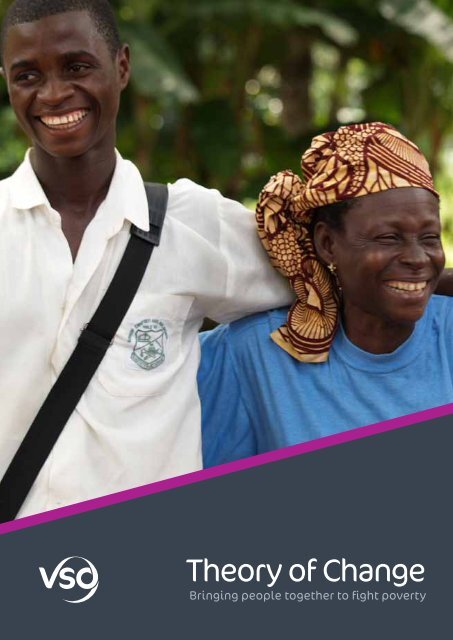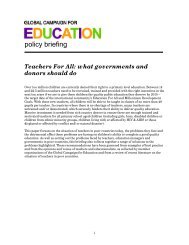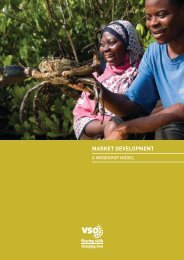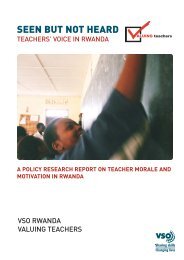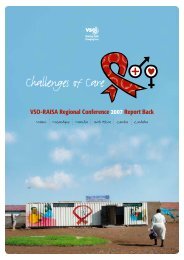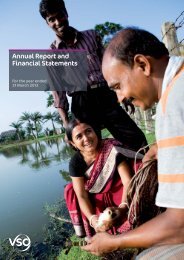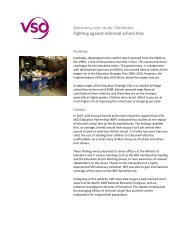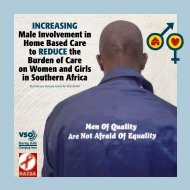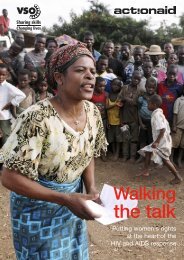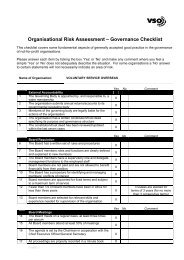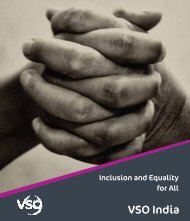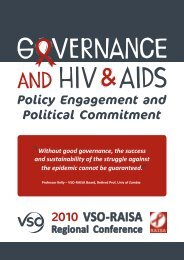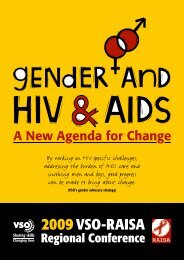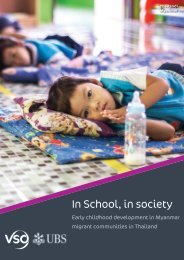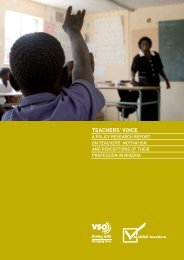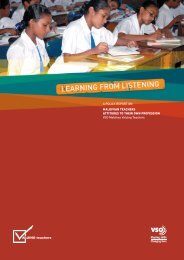Theory of Change - Bringing people together to fight poverty - VSO
Theory of Change - Bringing people together to fight poverty - VSO
Theory of Change - Bringing people together to fight poverty - VSO
You also want an ePaper? Increase the reach of your titles
YUMPU automatically turns print PDFs into web optimized ePapers that Google loves.
<strong>Theory</strong> <strong>of</strong> <strong>Change</strong><br />
<strong>Theory</strong> <strong>of</strong> <strong>Change</strong><br />
<strong>Bringing</strong> <strong>people</strong> <strong><strong>to</strong>gether</strong> <strong>to</strong> <strong>fight</strong> <strong>poverty</strong><br />
1
<strong>Theory</strong> <strong>of</strong> <strong>Change</strong><br />
<strong>Theory</strong> <strong>of</strong> <strong>Change</strong><br />
Contents<br />
<strong>Theory</strong> <strong>of</strong> <strong>Change</strong><br />
<strong>Theory</strong> <strong>of</strong> <strong>Change</strong> 1<br />
What do we want <strong>to</strong> change 1<br />
What can we change 1<br />
How do we bring about change 3<br />
The quality <strong>of</strong> services 3<br />
Strong civil societies 3<br />
Pro-poor policies 3<br />
Creating opportunities <strong>to</strong> <strong>fight</strong> <strong>poverty</strong> 4<br />
<strong>Theory</strong> <strong>of</strong> <strong>Change</strong> in action 4<br />
<strong>VSO</strong>’s <strong>Theory</strong> <strong>of</strong> <strong>Change</strong> explains our distinct contribution<br />
<strong>to</strong> development, drawn from over 50 years <strong>of</strong> experience.<br />
There are numerous government<br />
and non-government organisations<br />
each playing their own part in the<br />
development process. The purpose <strong>of</strong><br />
this paper is <strong>to</strong> explain the particular<br />
contribution that <strong>VSO</strong> makes, mindful<br />
<strong>of</strong> the complex fac<strong>to</strong>rs that keep <strong>people</strong><br />
living in <strong>poverty</strong>.<br />
This <strong>Theory</strong> <strong>of</strong> <strong>Change</strong> lays out what it<br />
means <strong>to</strong> put <strong>people</strong> at the centre <strong>of</strong><br />
development, and how bringing <strong>people</strong><br />
<strong><strong>to</strong>gether</strong> can achieve lasting change<br />
for the better. Our main resource is,<br />
and always has been, the <strong>people</strong> we<br />
work with, the <strong>people</strong> in our partner<br />
organisations, and the volunteers that<br />
support them. While our volunteering<br />
programme has become more complex<br />
and diverse, we remain an organisation<br />
that focuses on the contribution that<br />
<strong>people</strong> make <strong>to</strong> development.<br />
What do we want<br />
<strong>to</strong> change<br />
Our vision is a world without <strong>poverty</strong>,<br />
where excluded and marginalised<br />
women and men have choices and<br />
opportunities <strong>to</strong> participate effectively in<br />
society, have enough <strong>to</strong> feed and clothe<br />
their families, have access <strong>to</strong> education<br />
and healthcare service, have land on<br />
which <strong>to</strong> grow food or a job <strong>to</strong> earn<br />
a living.<br />
For <strong>VSO</strong>, putting <strong>people</strong> at the centre <strong>of</strong><br />
development means recognising that it<br />
is individuals who can play crucial roles<br />
in initiating, promoting and facilitating<br />
change in organisations, in the provision<br />
<strong>of</strong> services and in changing policies.<br />
What can we change<br />
Our development experience has led<br />
us <strong>to</strong> focus on four main dimensions <strong>of</strong><br />
change, conditions that are needed <strong>to</strong><br />
enable poor and marginalised <strong>people</strong>’s<br />
capabilities <strong>to</strong> be enhanced and their<br />
rights realised:<br />
• Improving poor <strong>people</strong>’s access <strong>to</strong><br />
quality services<br />
• Promoting the development and<br />
implementation <strong>of</strong> policies <strong>to</strong> support<br />
poor <strong>people</strong><br />
• Ensuring the participation <strong>of</strong> sociallyexcluded<br />
groups in determining their<br />
own path <strong>to</strong> development.<br />
• Building organisational capacity <strong>to</strong><br />
support these aims.<br />
The dimensions <strong>of</strong> change are<br />
interrelated and success for any <strong>of</strong> our<br />
programmes will be defined as changes<br />
in one or more <strong>of</strong> these dimensions (see<br />
diagram on page two).<br />
With this as our starting point, we<br />
believe that unequal and unjust power<br />
relations between <strong>people</strong> have <strong>to</strong> be<br />
addressed. For this <strong>to</strong> happen, poor and<br />
marginalised <strong>people</strong> must have access<br />
<strong>to</strong> quality essential services, be able <strong>to</strong><br />
work <strong>to</strong> improve their lives and have<br />
access <strong>to</strong> information and ideas that link<br />
them <strong>to</strong> the wider world.<br />
2<br />
©<strong>VSO</strong>/Simon Rawles<br />
1
<strong>Theory</strong> <strong>of</strong> <strong>Change</strong><br />
<strong>Theory</strong> <strong>of</strong> <strong>Change</strong><br />
<strong>VSO</strong>’s <strong>Theory</strong> <strong>of</strong> <strong>Change</strong><br />
Improve the quality <strong>of</strong>,<br />
and access <strong>to</strong>, services<br />
(eg. educaon, health, etc).<br />
Inspire individuals<br />
<strong>to</strong> see how they can<br />
make a praccal<br />
contribuon <strong>to</strong> fighng<br />
global <strong>poverty</strong> and<br />
create opportunies<br />
<strong>to</strong> do so.<br />
Marginalised<br />
<strong>people</strong> have good<br />
access <strong>to</strong> these<br />
services.<br />
Individuals and<br />
groups have space<br />
for parcipaon and<br />
decision-making.<br />
D i m e n s i o n<br />
Strengthen civil<br />
sociees <strong>to</strong> give <strong>people</strong><br />
a voice, choices and<br />
power over decisions<br />
that influence<br />
their lives.<br />
s o f<br />
c h<br />
a n<br />
Existence<br />
<strong>of</strong> a civil society<br />
holding governments<br />
<strong>to</strong> account.<br />
g e<br />
Improvement<br />
in the lives <strong>of</strong> poor and<br />
marginalised <strong>people</strong>.<br />
<strong>Change</strong>s<br />
in pro-poor policy,<br />
or implementaon<br />
<strong>of</strong> policy.<br />
Influence governments<br />
<strong>to</strong> develop and implement<br />
pro-poor policies.<br />
How do we bring about change<br />
By building a global volunteering movement as a way <strong>to</strong> bring<br />
<strong>people</strong> <strong><strong>to</strong>gether</strong>, we contribute <strong>to</strong> change at many levels.<br />
• By improving the skills <strong>of</strong> one individual, we can increase the<br />
effectiveness <strong>of</strong> a local organisation.<br />
• By changing a perspective <strong>to</strong> a problem, we can create a new<br />
approach <strong>to</strong> issues in a respectful way.<br />
• By creating a lasting difference in the aspirations <strong>of</strong> an<br />
individual, we can, over a lifetime, help transform an<br />
entire community.<br />
We work <strong>to</strong>wards contributing <strong>to</strong> the dimensions <strong>of</strong> change,<br />
placing different focus and emphasis depending on the context.<br />
The quality <strong>of</strong> services:<br />
NGOs and governments provide relevant and inclusive services<br />
which meet poor <strong>people</strong>’s declared needs, and which<br />
they play their part in shaping.<br />
A key part <strong>of</strong> improving quality <strong>of</strong> poor <strong>people</strong>’s lives – and<br />
sometimes the single most pressing priority – is that they<br />
should have access <strong>to</strong> quality services in health, education and<br />
other areas. In very poor countries where governments cannot<br />
yet provide basic services, <strong>VSO</strong> recruits international volunteers<br />
<strong>to</strong> deliver such services until institutional weaknesses are<br />
remedied. Volunteers also work alongside communities <strong>to</strong><br />
help them articulate their priorities, build capacity <strong>of</strong> serviceproviding<br />
organisations, and link organisations so that they can<br />
learn from each other’s experiences.<br />
Strong civil societies:<br />
Civil societies are stronger and more representative <strong>of</strong> poor<br />
and marginalised women and men.<br />
We believe in the role <strong>of</strong> civil society <strong>to</strong> hold governments <strong>to</strong><br />
account, and <strong>to</strong> deliver fair measures for all. We work with civil<br />
society organisations <strong>to</strong> challenge issues such as gender roles<br />
<strong>to</strong> bring about sustainable change <strong>to</strong> the face <strong>of</strong> <strong>poverty</strong>.<br />
We build stronger links and networks between organisations –<br />
both within countries and on a global level – so that they can<br />
relate <strong>to</strong> and learn from each other. We work in partnership<br />
with organisations, supporting them <strong>to</strong> learn and realise their<br />
own development agenda. When organisations are better<br />
linked, strengthened and representative, the <strong>people</strong> within<br />
them and those they work for acquire more power over the<br />
decisions that affect their lives.<br />
Pro-poor policies:<br />
Governments develop and implement pro-poor policies.<br />
<strong>Change</strong>s in policy, or in implementation <strong>of</strong> policy are <strong>of</strong>ten<br />
necessary before <strong>people</strong> are able <strong>to</strong> access quality services.<br />
Where they have been developed with the meaningful<br />
participation <strong>of</strong> civil society and representatives <strong>of</strong> poor and<br />
marginalised <strong>people</strong>, strong pro-poor policies can challenge<br />
issues <strong>of</strong> exclusion and gender inequality and deliver major<br />
improvements in service delivery for poor <strong>people</strong>.<br />
<strong>VSO</strong>’s work on pro-poor policy addresses the structural causes<br />
<strong>of</strong> <strong>poverty</strong> and disadvantage. We support civil society <strong>to</strong><br />
influence governments, as well as international bodies, <strong>to</strong><br />
develop and implement pro-poor policy and practice. The<br />
strength <strong>of</strong> <strong>VSO</strong>’s support <strong>to</strong> partners and poor <strong>people</strong> in<br />
demanding change is that the arguments are based on the<br />
direct experience <strong>of</strong> what is happening in poor communities.<br />
“Every day <strong>people</strong> thank us… not for doing<br />
the work for them, but for giving them the<br />
opportunity <strong>to</strong> work themselves. But it goes both<br />
ways. I’m incredibly grateful for the chance <strong>to</strong><br />
share my skills here and <strong>to</strong> learn.”<br />
Stephanie S<strong>to</strong>ker, volunteer, Peru<br />
We work <strong>to</strong>wards supporting a strong civil society that plays a<br />
vital role in the development, implementation and moni<strong>to</strong>ring<br />
<strong>of</strong> policies. In short, we support the work <strong>of</strong> community<br />
organisations, social movements and governments <strong>to</strong> bring<br />
about lasting change.<br />
2<br />
3
<strong>Theory</strong> <strong>of</strong> <strong>Change</strong><br />
Creating opportunities<br />
<strong>to</strong> <strong>fight</strong> <strong>poverty</strong><br />
To build a fairer world, individuals need <strong>to</strong> be convinced that<br />
they can make a difference, and <strong>to</strong> act on that conviction.<br />
Enabling this <strong>to</strong> happen is right at the heart <strong>of</strong> <strong>VSO</strong>.<br />
Internationally, we inspire <strong>people</strong> <strong>to</strong> see themselves as part <strong>of</strong><br />
a global community, and <strong>to</strong> step out in<strong>to</strong> that community <strong>to</strong><br />
be part <strong>of</strong> the <strong>fight</strong> against <strong>poverty</strong>. In the South, volunteers<br />
from around the world may live and work alongside poor<br />
communities, or work in government ministries and other<br />
organisations that affect the lives <strong>of</strong> poor <strong>people</strong>. <strong>Bringing</strong><br />
pr<strong>of</strong>essional skills that are not readily available, they directly<br />
provide services that would otherwise be denied <strong>to</strong> poor<br />
communities and may pass on those skills <strong>to</strong> colleagues so that<br />
organisations become lastingly more effective. With humility<br />
and openness <strong>to</strong> learning themselves, international volunteers<br />
become powerful agents <strong>of</strong> social change by inspiring in <strong>people</strong><br />
the confidence that they can change their world. Back in their<br />
own communities, international volunteers act differently and<br />
influence others <strong>to</strong> do likewise.<br />
<strong>Theory</strong> <strong>of</strong> <strong>Change</strong> in action<br />
By giving <strong>people</strong> an opportunity <strong>to</strong> volunteer within or outside<br />
their communities, <strong>VSO</strong> helps them become the drivers <strong>of</strong><br />
change. They can be active citizens, able <strong>to</strong> share their own<br />
development. We bring <strong>people</strong> <strong><strong>to</strong>gether</strong> <strong>to</strong> achieve lasting<br />
change in the following ways, we:<br />
• Motivate <strong>people</strong> <strong>to</strong> contribute in the local or global<br />
community <strong>to</strong> <strong>fight</strong> <strong>poverty</strong><br />
• Understand organisations and work with them <strong>to</strong> progress<br />
<strong>to</strong>wards their aims<br />
• Recruit and supply <strong>people</strong> who can deliver essential services<br />
• Bring knowledge <strong>to</strong> help those who decide on and<br />
implement policies<br />
• Share learning and experience between <strong>people</strong>,<br />
organisations and governments.<br />
We believe communities can begin <strong>to</strong> change things for the<br />
better when ordinary <strong>people</strong> are motivated <strong>to</strong> step forward.<br />
Community level volunteering can provide poor <strong>people</strong> with<br />
opportunities for personal development and increase their<br />
voice in decision-making, thus increasing local level ownership<br />
<strong>of</strong> the development agenda. <strong>VSO</strong> supports the efforts <strong>of</strong><br />
ordinary women and men who seek <strong>to</strong> transform their own<br />
communities and have the confidence <strong>to</strong> step forward <strong>to</strong><br />
become active citizens who can shape their own development.<br />
“I’m really proud <strong>of</strong> what the team achieved. We<br />
went from virtually nothing <strong>to</strong> having objectives,<br />
work plans, policies and budgets. But most<br />
importantly for me, by the time I left the change<br />
was being lead and driven by the staff – we’d got<br />
some real momentum going and it was being<br />
sustained.”<br />
Martin Fawdry, volunteer, Nigeria<br />
Carl<strong>to</strong>n House, 27A Carl<strong>to</strong>n Drive<br />
Putney, London SW15 2BS, UK<br />
+44 (0)20 8780 7500<br />
www.vsointernational.org<br />
<strong>VSO</strong> is a registered charity in England<br />
and in Wales (313757) and in<br />
Scotland (SC039117)<br />
Cover image ©<strong>VSO</strong>/Ben Langdon<br />
Published 2011<br />
<strong>VSO</strong> Bahaginan<br />
www.vsobahaginan.org.ph<br />
<strong>VSO</strong> Ireland<br />
www.vso.ie<br />
<strong>VSO</strong> Ji<strong>to</strong>lee<br />
www.vsoji<strong>to</strong>lee.org<br />
<strong>VSO</strong> Netherlands<br />
www.vso.nl<br />
<strong>VSO</strong> UK<br />
www.vso.org.uk<br />
CUSO-<strong>VSO</strong><br />
www.cuso-vso.org


